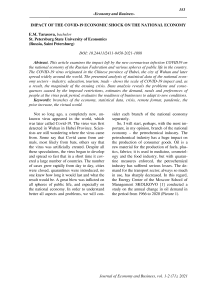Impact of the COVID-19 economic shock on the national economy
Автор: Tarasova E.M.
Журнал: Экономика и бизнес: теория и практика @economyandbusiness
Статья в выпуске: 1-2 (71), 2021 года.
Бесплатный доступ
This article examines the impact left by the new coronavirus infection COVID19 on the national economy of the Russian Federation and various spheres of public life in the country. The COVID-19 virus originated in the Chinese province of Hubei, the city of Wuhan and later spread widely around the world. The presented analysis of statistical data of the national economy sectors - industry, education, tourism, trade - shows the scale of COVID-19 impact and, as a result, the magnitude of the ensuing crisis. Data analysis reveals the problems and consequences caused by the imposed restrictions, estimates the demand, needs and preferences of people at the virus peak period, evaluates the readiness of businesses to adapt to new conditions.
Branches of the economy, statistical data, crisis, remote format, pandemic, price increase, virtual world
Короткий адрес: https://sciup.org/170183068
IDR: 170183068 | DOI: 10.24411/2411-0450-2021-1088
Текст научной статьи Impact of the COVID-19 economic shock on the national economy
Not so long ago, a completely new, unknown virus appeared in the world, which was later called Covid-19. The virus was first detected in Wuhan in Hubei Province. Scientists are still wondering where the virus came from. Some say that Covid came from animals, most likely from bats, others say that the virus was artificially created. Despite all these speculations, the virus began to develop and spread so fast that in a short time it covered a large number of countries. The number of cases grew rapidly from day to day, cities were closed, quarantines were introduced, no one knew how long it would last and what the result would be. A great blow was inflicted on all spheres of public life, and especially on the national economy. In order to understand better all aspects and problems, we will con- sider each branch of the national economy separately.
So, I will start, perhaps, with the most important, in my opinion, branch of the national economy – the petrochemical industry. The petrochemical industry has a huge impact on the production of consumer goods. Oil is a raw material for the production of fuels, plastics, fabrics; it is used in medicine, cosmetology and the food industry, but with quarantine measures enforced, the petrochemical industry has suffered serious losses. The demand for the transport sector, always so much in use, has sharply decreased. In this regard, the Energy Center of the Moscow School of Management SKOLKOVO [1] conducted a study on the annual change in oil demand in the period from 1966 to 2020 (Picture 1).
-2
-4
-6
-8
-10
-12
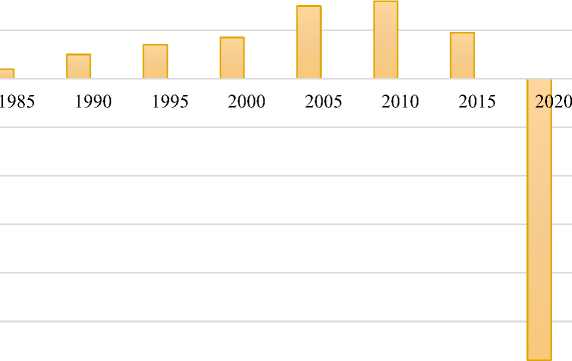
-14
Picture 1. Annual change in oil demand from 1966 to 2020 [1]
The chart clearly shows that there has never been such a sharp change in oil demand. Now the oil industry goes through difficult times and endures the most severe crisis in history. Despite the fact that the enterprises have already resumed their work, and air traffic restrictions were lifted, the industry indicators of this year have dropped catastrophically all the same.
The next no less important branch of the national economy is education. The pandemic affected education around the world, and all educational institutions were forced to go into quarantine and opt for distance learning arrangements. In this regard, the Analytical Center of the National Agency for Financial Research (NAFI) [2] conducted a survey among teachers on how ready the education system was for the online training (Table 1).
Table 1. Readiness of the education system to learn in an online format [2]
|
Percentage of teachers |
|
|
Completely ready |
1 |
|
Rather ready |
23 |
|
Rather NOT ready |
57 |
|
Totally unprepared |
11 |
|
Difficulty in answering |
8 |
Based on the above data, it follows that the majority of respondents consider the Russian education system not ready for distance learning. Among the main problems identified by teachers were lack of computer equipment for both teachers and students which makes remote classes practically impossible; the heterogeneity of the platforms on which training takes place; the low level of information literacy of participants in the educational process. The first problem is related to insufficient availability of computers, laptops and tablets in schools and other educational institutions, teachers and students themselves may not have all the necessary hardware and software at home. In some remote areas located far away from major cities, there is still no highspeed Internet that would allow modern online platforms to work steadily. At the same time, online platforms are represented by a wide variety of software: Zoom, Skype, Google classroom, Moodle, Big Blue Baton, Teams and others, which is both an advantage and a disadvantage. The negative point is that many teachers and students, especially in schools, do not have sufficient knowledge in information technology. To teach some subjects (for example, math), you have to use additional software, such as Paint or a Notebook for writing formulas by hand. With a lowspeed connection, it is quite difficult to do this because of the delay in displaying infor- mation from the interlocutor. In addition, the Analytical Center of NAFI [2] conducted another survey among teachers on the topic: how did the transition to distance learning affect the quality of knowledge and the level of student training (Table 2).
Table 2. How did the transition to distance learning affect the quality of knowledge and the level of students training? [2]
|
The national average |
Teaching experience |
|||
|
Up to 15 |
From 16 to 30 |
More than 30 |
||
|
The quality of training will improve |
6 |
6 |
6 |
6 |
|
The quality of training will decrease |
66 |
76 |
63 |
64 |
|
The quality of training will remain the same |
28 |
18 |
31 |
30 |
From the data provided in Table 3, it follows that the majority of teachers surveyed had a negative attitude to the quality of training in the distance format. Many teachers believe that with the transition to online learning, children will lose interest in studies, it will become more difficult to digest new material, teacher-to-student interaction process will be disrupted and this factor is an integral part of education. Of course, the disadvantages of online learning are greater than the advantages, even though the systems are technically adequate and there is a wide variety of them, but we are still far from perfect. In my opinion, online learning has a future, but it should be applied selectively. The online format is suitable for people with higher professional education who take advanced training courses. For schoolchildren and students, such education will not be effective.
The next branch of the national economy that I will consider is tourism. Tourism has not had an easy time this year. The closure of borders, airports, museums and parks has dramatically affected the work of the tourism business. Guests from China have always been the most active travelers, and recently, representatives of South Asia, for example, India, Sri Lanka, have become interested in traveling to Russia. However, with the closure of borders, all the threads with the outside world were cut off for the tourist industry; the opportunity to make money, receive foreign tourists and send Russian tourists abroad was lost. The hotel business grew and developed only thanks to foreign tourists, but with the restrictions imposed, a quarter of all the hotel facilities were closed. All hope was for the summer of 2020, everyone to the last moment hoped for the resumption of air traffic, the opening of borders and the return of the usual tourist life, but unfortunately, this did not happen. Though some of the restrictions were eased, the borders remained closed. The only option left for Russian tourists was to travel within the country. In this regard, the Medialogia system for SMM [3] conducted research and compiled a rating of holiday spots preferred by Russian travelers (Picture 2).
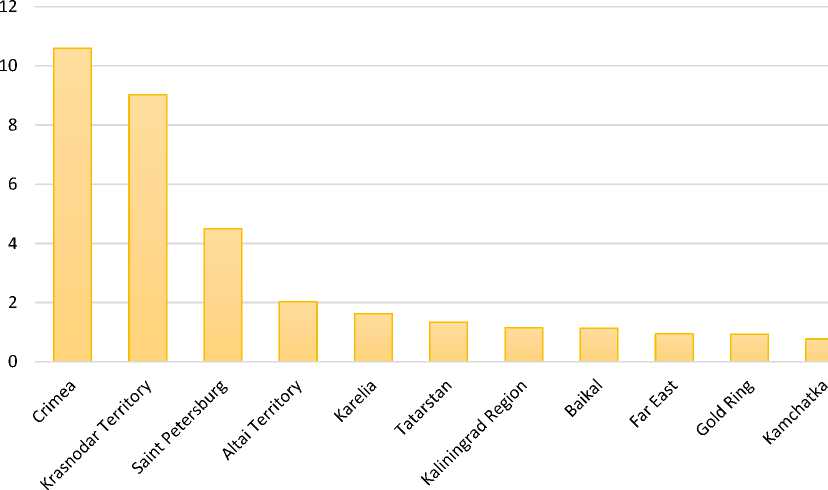
Picture 2. Popularity rating of tourist destinations in 2020 [3]
Based on the data of picture 2, one can see that the most popular holiday destination is the Crimea. Indeed, after restrictions were lifted, most Russians went to the Crimea for a holiday. There was great excitement and rush among Russian tourists to visit cities like Yalta, Alushta, Alupka, Feodosia, Yevpatoria and Sudak. Prices on the peninsula have risen sharply. The increase in prices happened due to the fact that the Russians lost the opportunity to travel abroad and had to choose a domestic resort. The only suitable place for a seaside summer holiday in Russia are the resorts of the Black Sea coast of the Crimea and the Krasnodar Territory. In this regard, the sharply increased demand led to an increase in prices for rental housing, air travel and the provision of various services. The analytical bulletin of the National Research University of the Higher School of Economics [4] conducted research and showed statistics on the number of people traveling abroad in the world for a year (Picture 3).
2000 2001 2002 2003 2004 2005 2006 2007 2008 2009 2010 2011 2012 2013 2014 2015 2016 2017 2018 2019 2020
Picture 3. Number of people traveling abroad in the world in millions [4]
Analyzing the presented data picture 3 shows that in the period from 2009 to 2019 the number of tourists visiting abroad is rapidly growing. This figure has increased by 5% annually, but due to the Covid-19 pandemic, the number of abroad travelers has sharply decreased in 2020.
It is no secret that 2020 is a year of global change. With the introduction of quarantine, our entire life has moved into the "virtual world". Study, work, shopping, entertainment
- everything became online. People quickly acquired the taste for this situation finding it to be much more convenient. The most popular online orders have been the food order. There are currently several major suppliers of food products: the Yandex.Food, Delivery Club and Sbermarket. In this regard, the Advantshop [5] service provided research on how the online services market has changed due to the epidemiological situation (Picture 4).
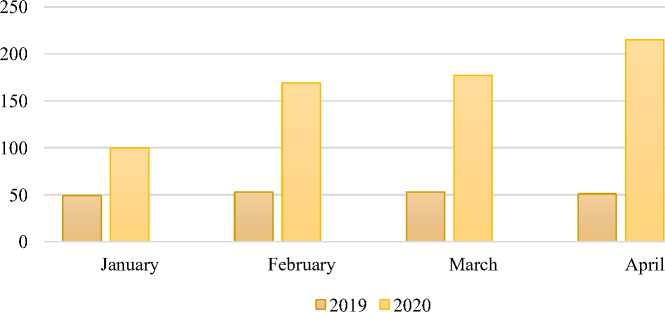
Picture 4. The number of online food orders [5]
The number of online food orders has increased markedly. Quarantine began in the spring, which means that some people had the opportunity to go to the country and live in self-isolation in the fresh air. Many of those who remained locked within four walls went for apartment renovation. In this regard, the number of online orders for home, garden, repair according to the Advantshop service increased by 11% compared to the previous year. This is clearly seen in picture 5.
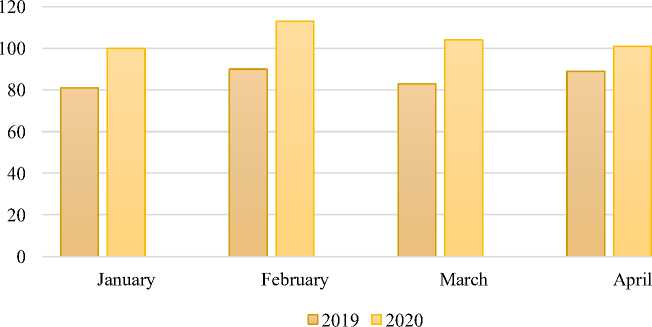
Picture 5. The number of online orders for house, garden, repair [5]
A large number of people have been making online orders for clothes and shoes for several years. This is very convenient, as you can select order and try a thing of your choice from the comfort of your home. Advantshop also conducted research on this topic (Picture 6).
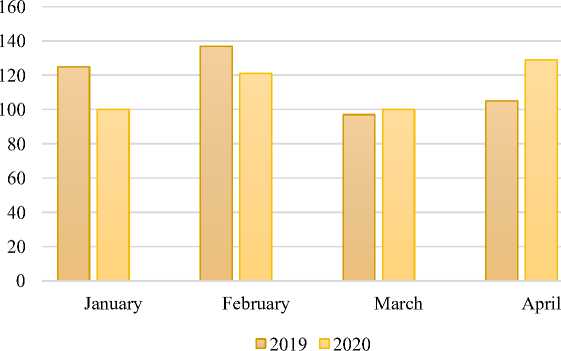
Picture 6. The number of online orders for clothing and shoes [5]
Studies have shown that the number of online orders compared to last year almost did not change, but the peak occurred in the month of April. According to Advantshop researchers, home wear and pajamas were in high demand.
Having analyzed various sectors of the economy, I can say that our country is experi- encing a crisis in almost all areas. This difficult situation has affected every citizen of the country; everyone is going through a difficult period in life. You need to understand that the crisis is also a kind of a movement. After we have overcome it, we will discover new opportunities.
Список литературы Impact of the COVID-19 economic shock on the national economy
- Коронакризис: влияние Covid-19 на ТЭК в России. Сайт Росконгресс. - [Электронный ресурс]. - Режим доступа: https://roscongress.org/materials/koronakrizis-vliyanie-covid-19-na-tek-v-mire-i-v-rossii
- Блинов С. Образование под ударом коронавируса: трудности школ и мнения педагогов. Сайт Activityedu. - [Электронный ресурс]. - Режим доступа: https://activityedu.ru/Blogs/analytics/obrazovanie-pod-udarom-koronavirusa-trudnosti-shkol-i-mneniya-pedagogov
- Где Россияне отдыхают в 2020. Сайт Медиалогия для SMM. - [Электронный ресурс]. - Режим доступа: https://www.mlg.ru/products/smm
- Зайцев А.А., Тихонов А.А. Аналитический бюллетень НИУ ВШЭ об экономических и социальных последствиях коронавируса в России и в мире. Обзор влияния пандемии на туристическую отрасль. - [Электронный ресурс]. - Режим доступа: https://www.hse.ru/data/2020/06/19/1607524011/HSE_Covid_06_2020_4_1.pdf
- Исследование онлайн продаж во время карантина. Журнал AdvantShop. - [Электронный ресурс]. - Режим доступа: https://www.shopolog.ru/metodichka/analytics/issledovanie-onlayn-prodazh-v-period-karantina

